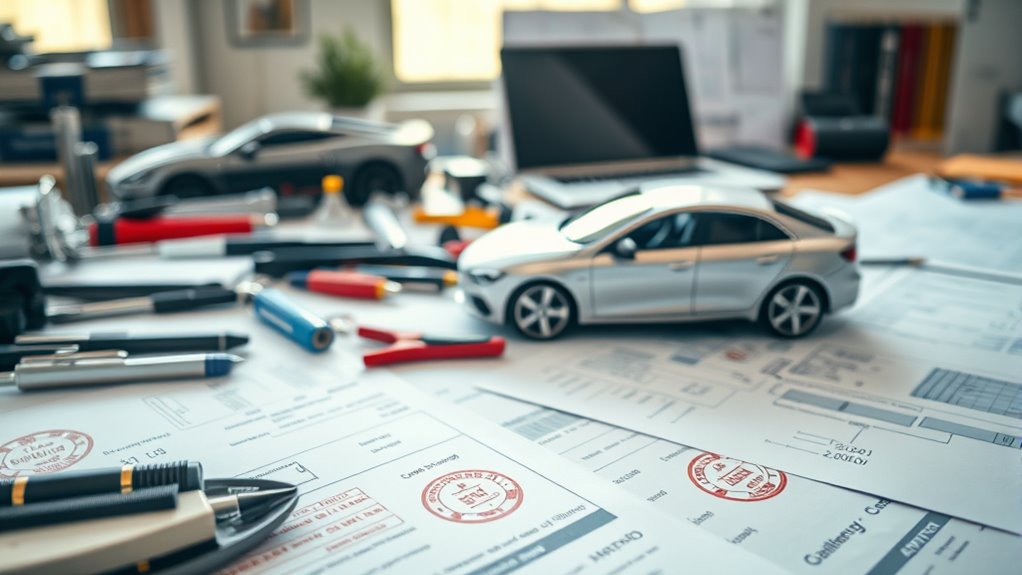To estimate startup costs for vehicles, equipment, and permits, start by listing all necessary items and researching current prices and fees. Include vehicle purchases, insurance, registration, and maintenance costs. For equipment, note purchase prices, setup, and future replacement expenses. Don’t forget permits and licensing fees required for your industry. By comparing quotes and calculating total expenses carefully, you’ll build a strong financial plan. Continuing will help you master the details for an accurate estimate.
Key Takeaways
- List all required vehicles, research their prices, and include insurance, registration, and maintenance costs.
- Identify essential equipment and supplies, obtain quotes, and account for setup, upgrades, and replacements.
- Compile vehicle and equipment costs into a detailed list to ensure comprehensive startup expense estimation.
- Research permits, licenses, and regulatory fees specific to your business type and location.
- Use accurate cost estimates to create a realistic budget and develop a strong funding strategy.

Are you unsure how much money you’ll need to launch your new business? Estimating startup costs is a vital step in planning your venture, especially when it comes to vehicles, equipment, and permits. To do this effectively, you need to conduct a thorough cost analysis that considers every element involved. Start by listing all the vehicles you’ll require—whether it’s a delivery van, company car, or specialized transport—and research their prices. Don’t forget to include insurance, registration, and maintenance costs. Next, evaluate the equipment you’ll need, such as computers, machinery, tools, or furniture. Itemize each piece and get quotes from multiple suppliers to guarantee accuracy. This detailed cost analysis helps you understand the real expenses involved and avoid surprises down the line.
Once you’ve identified these costs, it’s important to think about your funding strategies. Knowing your total startup costs allows you to determine whether you’ll use personal savings, seek loans, attract investors, or explore grants. If your estimates show significant expenses, you might need to develop an all-encompassing funding plan. This could involve approaching banks for small business loans or tapping into government programs designed to support startups. Alternatively, crowdfunding platforms or angel investors could be viable options, especially if your business idea has a strong community appeal or growth potential. Having a clear picture of your expenses and potential funding sources makes your business plan more compelling and increases your chances of securing the necessary capital.
Frequently Asked Questions
How Can I Find Affordable Vehicle Options for My Startup?
You can find affordable vehicle options for your startup by exploring used vehicle listings online and visiting local dealerships to compare prices. Consider leasing options, which often require lower upfront costs and offer flexibility. Additionally, check out certified pre-owned programs for reliable used vehicles. Negotiating prices and financing terms can also help you secure a more budget-friendly option, ensuring you get the best deal for your business needs.
What Permits Are Required for Different Industries?
Getting permits is like revealing the secret code to your industry’s success! You’ll need to research industry licensing requirements specific to your field, then complete the permit application process. For example, food businesses require health permits, while construction needs building permits. Always check local, state, and federal regulations, as each industry has unique licensing rules. Staying compliant guarantees smooth sailing and keeps you out of trouble.
How Do I Estimate Ongoing Maintenance Costs?
To estimate ongoing maintenance costs, start by creating a maintenance budgeting plan that includes regular inspections and repairs. Track your costs diligently to identify patterns and unexpected expenses. Consider factors like vehicle usage, equipment age, and industry standards. Regularly updating your cost tracking helps you stay prepared for future repairs, ensuring you allocate enough funds to keep everything running smoothly without surprises.
Are There Grants Available for Equipment Purchases?
Yes, there are grants for startups that can help with equipment funding opportunities. You should research local, state, and federal programs that support small businesses and new ventures. Look into industry-specific grants or small business innovation grants, which often include equipment purchases. Keep in mind that eligibility requirements vary, and you’ll need to prepare a solid application demonstrating how the equipment benefits your startup’s growth and community impact.
How Long Does It Typically Take to Acquire Necessary Permits?
The permit timelines usually vary, depending on your location, the type of permit, and the approval process involved. You might wait anywhere from a few weeks to several months. During this period, you’ll complete paperwork, submit applications, and possibly attend inspections. Staying proactive, following up regularly, and understanding the approval process can speed things up, ensuring you get your permits as swiftly as possible and stay on track with your startup plans.
Conclusion
By paying close attention to your startup costs, you’re setting a solid foundation for growth. While initial investments might seem like a steep hill, they’re really just stepping stones toward a more stable future. With careful planning and a mindful approach, you’ll find that the path becomes clearer, and what once felt like a burden will turn into an opportunity. Remember, every challenge faced today can be the cornerstone of tomorrow’s success.









